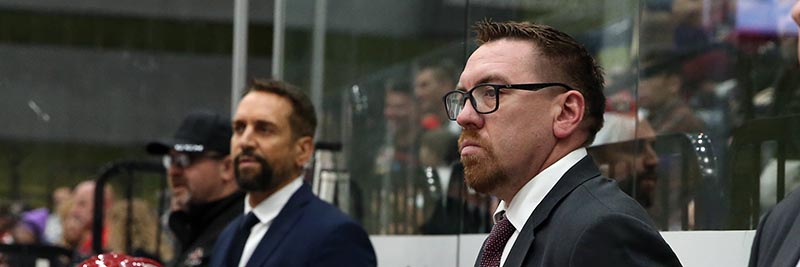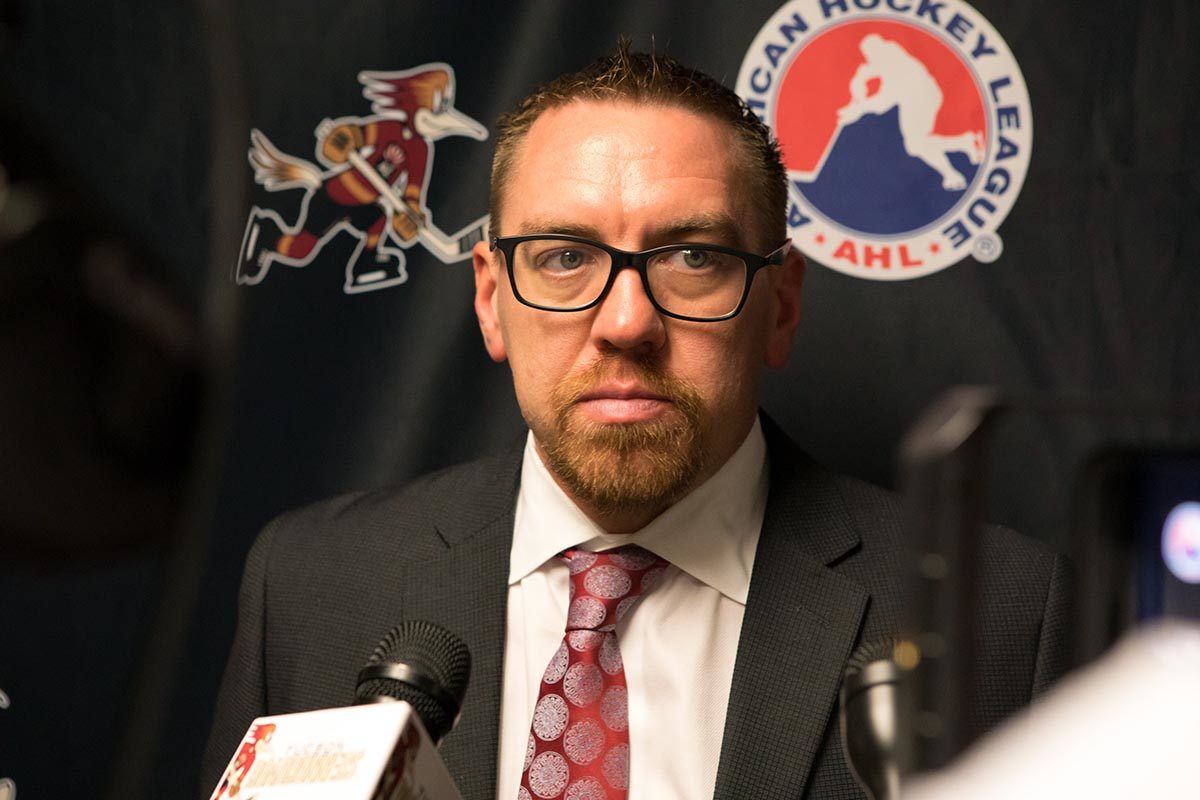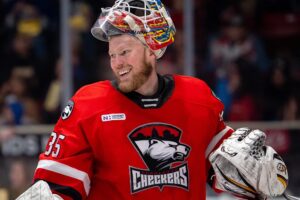by Walt Ruff | AHL On The Beat
Jay Varady never intended to be a hockey coach.
He is though, and he’s a good one. An All-Star coach, in fact.
“I was playing college hockey, Division I at Union College,” said the second-year head coach of the Tucson Roadrunners. “I was captain of the team and all indications were that I was not a very good player, but I was going to try and play minor-pro hockey for a period of time, until someone told me otherwise.
“My junior year I thought I had a shoulder injury. I went to the doctor and he told me I had spinal stenosis.”
Spinal stenosis – an abnormal narrowing of the spinal canal or neural foramen that results in pressure on the spinal cord or nerve roots – left Varady at risk for paralysis and ended his playing career immediately.
Being the leader of the team and roommates with team’s assistant captains, the then-22-year-old pivoted to the next closest avenue that allowed him to be involved in the game, serving as the team’s volunteer assistant coach for the next season and a half.
But even his first experience behind the bench and the 18-month period of transition in his life hadn’t provided him with the rationale that coaching was what his future held or what he was set out to do.
“After college I went back and coached a 16U Midget AAA team for a year and thought I was going to work in the financial industry with my economics degree. The one thing I knew though was that I enjoyed going to the rink more than I enjoyed going to work. So I said screw it, let’s go coach.”
Fast-forward 19 years, following stops in the North American Hockey League, the Western Hockey League, France, the United States Hockey League and the Ontario Hockey League, Varady’s investment in himself has seemingly paid off.
Now in his second season of being tasked with the day-to-day of heading the Arizona Coyotes’ American Hockey League team, it’s not only his advanced knowledge of the game (and economics) that has produced success, it’s also his ability to be an effective communicator that’s proven to be a key factor in the “return” he’s received from his players.

“Getting the players to buy in takes great communication and the right person,” said Roadrunners general manager Steve Sullivan remarked. “For you [as a head coach] to have the respect of the players, you have to have a relationship with them. It’s not just small talk either; it’s conversations that are going to help them get better. That’s what the new generation of players expects. We believe Jay is doing a good job in doing that.”
It’s not just the upper management that sees it that way though.
Defenseman Dysin Mayo, one of just three players on the Roadrunners’ roster who have been with the team in Tucson since its inception in 2016, attributes a portion of his career-best season thus far to the work he sees exemplified from his team’s head coach.
“He’s always trying to learn, not only for himself, but to teach us as well,” Mayo said. “He watches other teams, other leagues, anything that can help us, he provides us. He’s always watching, always talking hockey. He’s at the airport doing video; he’s on the bus right after games doing video, instantly. He’s always trying to improve our team. We know that he’s working hard to give us the best chance to win every night and when you see that, it makes it easier to give it back to him.”
So far, so good this season in terms of the “profit” Varady has achieved with his players, as Tucson currently paces the AHL with their 28-9-1-0 (.750) record.
Depending on whom you ask, the success has been achieved in different ways. In Varady’s eyes, it’s the players that have achieved the significant results. However, even those who work closest to the Cahokia, Ill., native marvel at the way he is able to tap into his group and maximize each player’s potential.
“The best leaders empower others and [Jay] does that,” assistant coach Steve Potvin said. “He’s always very lenient, very open and he asks a lot of questions, both to the guys and us. With that being said, our organization expects a relationship based on trust and respect, and you can see he wants to understand that we’re all thinking the same way.”
By way of empowering others and instilling confidence in his roster, Varady’s guidance has allowed players like forward Lane Pederson to develop from an undrafted first-year pro to a near point-per-game All-Star selection in under two seasons.
In 2016-17, Pederson’s first-year in the American Hockey League and one year prior to Varady’s arrival in the organization, Pederson totaled 12 goals and 26 points in 63 games. During Varady’s first campaign at the helm, the Pederson nearly doubled his output, matching a team record with 23 goals and adding 24 assists.
Courtesy of his stellar first half this season, Pederson was selected to represent the Roadrunners in this weekend’s AHL All-Star Classic in Ontario, where Varady will be head coach of the Pacific Division squad.
“The relationships we build and the ability to help players get better are what I’m most proud of,” stated Varady. “If you can establish a situation where you help players get better, whether it be two years, five years, 10 years down the road and you’re able to look back and have someone say to you, ‘Hey, at that time in my life, that was helpful,’ or ‘That message was helpful and it helped me grow and get better,’ that’s what I’m in it for.”






































